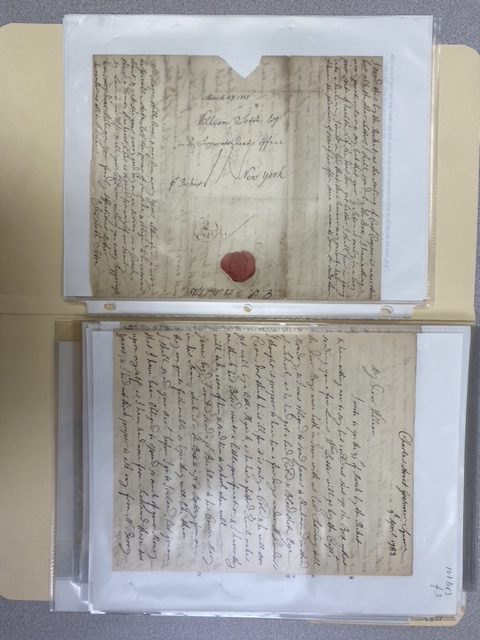We are thrilled to introduce #ArchivesDeepDive, a recurring series of write ups on the research done within the Msgr. William Noe Archives & Special Collections by our own staff and students, faculty, and members of the general public.
The Archives & Special Collections recently welcomed Professor Sean Harvey into the Reading Room for a sneak preview of our new acquisition of Seton Family Papers. These new materials were generously donated by the Sisters of Charity of New York. These papers consist of letters from Elizabeth Ann Seton’s relatives both before and after her lifetime as well as records of the family’s international shipping business, which played such a monumental role in Mother Seton’s life. The sisters not only took meticulous care of these valuable records but transcribed them so that modern readers can easily decipher the contents of the 18th century script.
Harvey focused on the correspondence of William Seton, father-in-law of our university’s namesake, Elizabeth Ann Bayley Seton, and his mother from 1782-83. William Seton was a prominent merchant in New York City during the American Revolution. Like many merchants of this time, Professor Harvey notes that he was a Loyalist, who felt the reason for his own success was the result of a prosperous British Empire and faithfulness to King George III. Seton remained in New York City throughout the war since it remained primarily under British control, but the pending British evacuation after the war “left William Seton exposed, vulnerable to retaliation once patriots took control of the city” Professor Harvey regards. While we do not have his own words, we can see this vulnerable sentiment reflected in letters from his mother, Elizabeth Seton, who writes in December of 1782 “you will have it more in your power than ever to make a large Fortune, as the Americans will be wiser, and more selfish, than to drive Honest industrious People out of their Society.”
As the popular idiom says, history is written by the victors, and a simple exchange between a mother and son provides larger insight on what the American Revolution meant to those who opposed it. In addition, Professor Harvey notes, this correspondence “hints at the resiliency of family ties despite an ocean-wide separation and the disruption of war and revolution”.
There is still much to be explored in the Seton family papers. If you are interested in doing your own research, make an appointment with us here. The Archives & Special Collections is open Mon-Fri from 9am-5pm.
Have an idea for your own #ArchivesDeepDive? Email archives@shu.edu.
